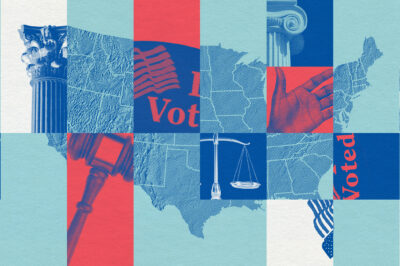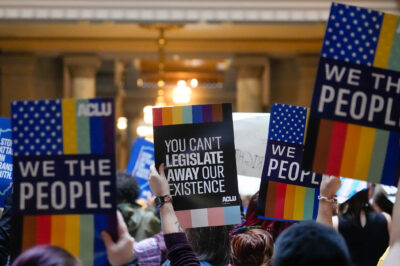Ponder this: A U.S. citizen joins an organization to advance political goals. Some in the group engage in illegal activity but the citizen’s own goals and activities are legitimate. The government blacklists the organization and says that working for it or taking a leadership role in it is a crime. May the government prosecute the citizen for her activities even though she didn’t intend to do anything wrong? May the citizen challenge the blacklisting in her criminal trial? After all, if it weren’t for the blacklisting, her activity would not be criminal and would be protected by the First Amendment.
You might think the scenario Orwellian and the answers clear – no to the first question, and yes to the second. But the statutory scheme governing “material support” for a terrorist group, last amended by Congress in 2004, says otherwise, and a similar scenario is now playing out in federal district court in Brooklyn.
Zeinab Taleb-Jedi is a 52-year-old U.S. citizen who faces up to 15 years in prison for providing “material support” – in the form of herself – to the Mojahedin el-Khalq (MEK), a group that opposes the current regime in Iran. Her case is a striking illustration of the problems with the material support statute and the way it is applied by the government. In a friend-of-the-court brief the ACLU filed last week, we argued that Ms. Taleb-Jedi’s criminal indictment should be dismissed because the material support statute violates the First Amendment right to freedom of association and the Fifth Amendment’s guarantee of due process.
Ms. Taleb-Jedi’s lawyers describe MEK as an organization dedicated to the overthrow of the government of Iran, and one with which the United States has apparently cooperated. The government designated MEK a foreign terrorist organization starting in 1997. But nowhere in the government’s charges against Ms. Taleb-Jedi is there any suggestion that she intended to support or to further any unlawful aim of MEK. In essence, the case is one of guilt by association.
The first major problem with the material support statute, therefore, is that the government doesn’t have to show intent to do wrong, so it can prosecute people like Ms. Taleb-Jedi for activity that would be protected by the First Amendment. But the First Amendment’s right to freedom of association doesn’t just protect attending a meeting or carrying a membership card, but also the right to work for a political organization, and to “organize, manage, supervise, or otherwise direct” the organization – the very activities criminalized by the material support statute. One person cannot be held criminally liable simply because someone else she associates with engages in criminal activity. In the United States, the Supreme Court has repeatedly held, we do not criminalize guilt by association.
The second constitutional problem with the material support statutory scheme is that it specifically prohibits defendants like Ms. Taleb-Jedi from challenging the government’s designation – essentially blacklisting – of an organization. This is true even though the government’s designation is the predicate that determines whether the defendant’s behavior is lawful or not. In Ms. Taleb-Jedi’s case, if it weren’t for the blacklisting of MEK, she would be free to support, advocate for, associate with, volunteer under, organize and be a leader of MEK, even if it had unlawful as well as lawful aims. Essentially, the blacklisting exposed Ms. Taleb-Jedi to severe criminal penalties for exercising her First Amendment rights.
Despite the importance of the blacklisting to Ms. Taleb-Jedi’s criminal case, she does not have the right to challenge it in her own criminal trial. The provision prohibiting her from doing so violates the First and Fifth Amendments. As the Supreme Court has held, the Constitution mandates that a defendant in Ms. Taleb-Jedi’s position be able to challenge in a meaningful judicial proceeding the underlying designation that strips her of her rights. Simply put, no other party or person has as much at stake in her criminal trial as Ms. Taleb-Jedi does. Under the Constitution, she must be able to challenge the government’s blacklisting designation – the direct cause of her prosecution.
Opponents may argue, as they often do in cases like this, that civil liberties must give way to national security concerns. But the First and Fifth Amendments aren’t optional and security and rights do not have to be at odds. In fact, it is in the context of national security cases that the Supreme Court has developed the precedent that directly applies to Ms. Taleb-Jedi. In those cases, from the 1950s and 60s, the Supreme Court addressed the rights of people accused of supporting the Communist Party, thought to be the greatest national security threat to the United States during that time. As the court held in United States v. Robel, “It would indeed be ironic if, in the name of national defense, we would sanction the subversion of one of those liberties … which makes the defense of the Nation worthwhile.”
The government is due to reply to the court filings in December. We’re continuing to watch this case closely and will keep you updated about developments.



